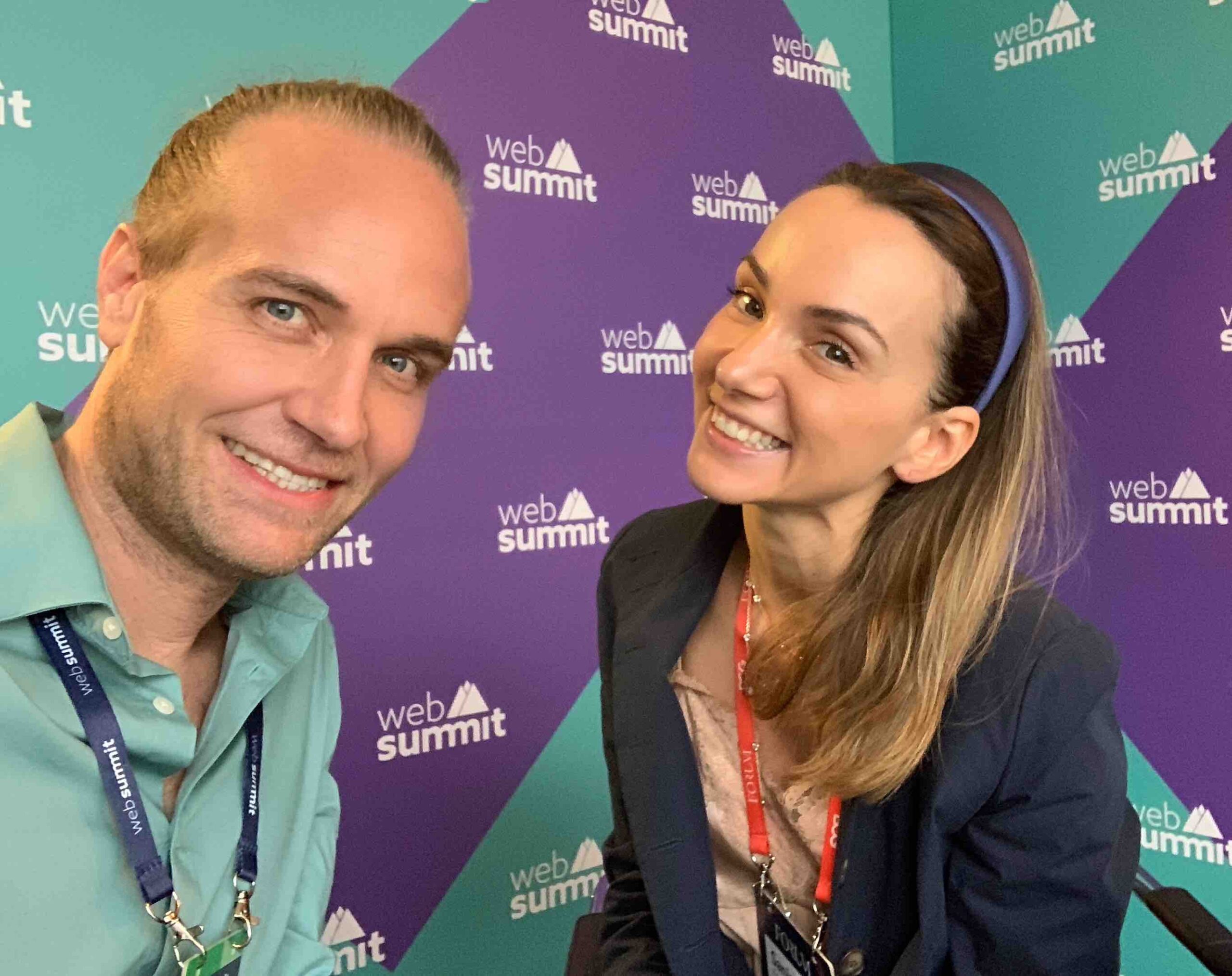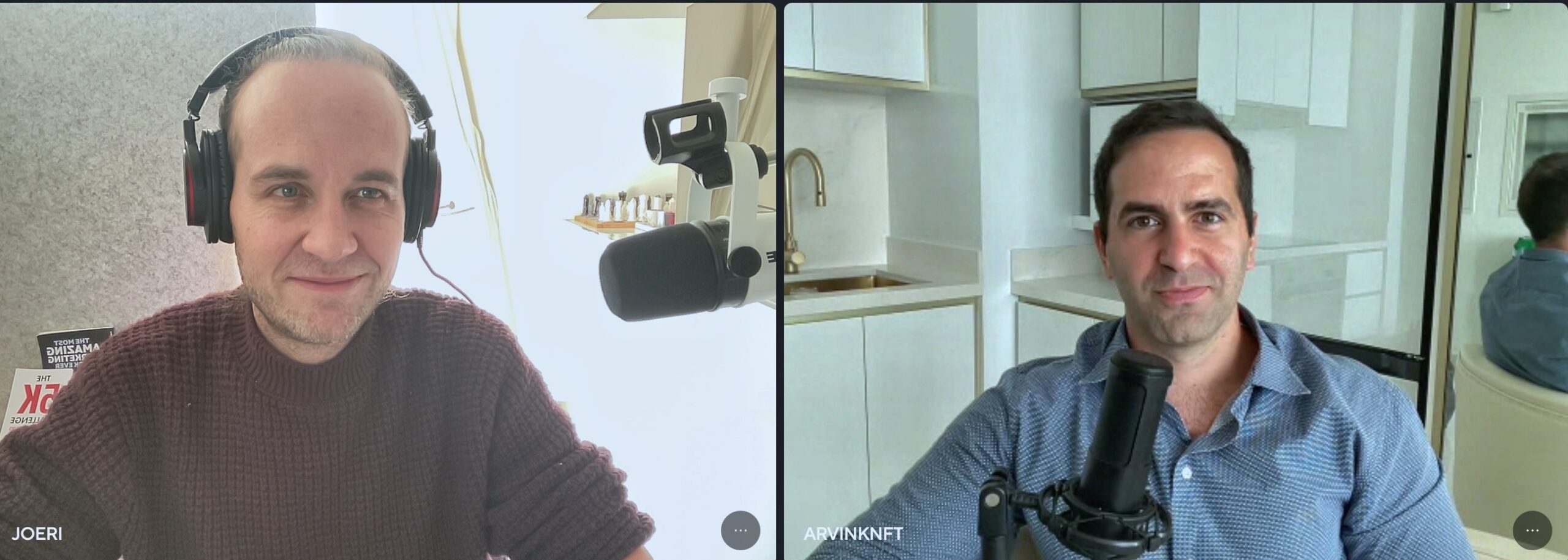Sanja Kon is originally from Croatia. She grew up in Italy and lived in the UK, the US, Portugal, and Denmark. Sanja has worked for many years in e-commerce and used traditional payment methods. She spent a lot of years at eBay and PayPal. Today she's the CEO of Utrust, a Blockchain-based payment ecosystem. Sanja’s company was acquired by Elrond Network at the beginning of this year. Talking about how this acquisition has affected her company, she stated that they now have more bandwidth to build products faster and better for the market and there are more resources available for the team to expand in more countries.
Talking about the impact of the bear market on Utrust, Sanja said they have not been affected on a very large scale unlike many companies because they facilitate everyday payments, B2B payments, remittances, companies paying their employees in crypto, etc. According to Sanja, many companies failed due to the bear market because they did not have solid fundamentals, principles, and values. So, this is a great time for companies like themselves to focus on building and growth in the long term.
Sanja also talked about different companies deciding to accept cryptocurrency as a payment method not only to drastically decrease their costs but also to appeal to a new segment of customers. With everything that's happening, like the war, and the pandemic, more and more people are turning to crypto to hedge their wealth and be able to be in control of their money. So, in the next few years, as stated by Sanja, we will see an even more rapid acceleration of crypto payments.
Sanja believes the next couple of years is going to be all about the Metaverse. She believes the Metaverse is going to change the way we do education, the way we communicate, the way we play, and the way we interact and it's going to complement our everyday life. Moreover, in the coming years, everyone will be able to process payments in a way that you can move money from the Metaverse and the digital world into the real world. Sanja’s company will be enabling all the payments happening in the Metaverse to be used in the real world to bridge the gap between the Metaverse and the real world.

Why Are Crypto Payments to Soar in the Next Few Years – with Sanja Kon
According to Sanja, the main issue for companies in the crypto space these days is that they don't understand that if you want to onboard the next wave of customers, you need to provide an experience that still resembles a Web2 experience because that's what people are used to. Therefore, her company designed its payment gateway in a way that anyone, even if they don't have crypto knowledge, can integrate it and can start accepting crypto payments to make people feel inclusive and hopeful for Metaverse.
Effective communication and education are considered fundamental by Sanja to lure people to Web3. Sanja believes that if you're selling something that people might not even perceive they needed, there's a lot of education that's needed for people to understand what they can have in the Web3. So, all the companies in the Web3 space need to invest in the education of new customers.
Sanja stated that Telegram is the main platform for her company to interact with Web3 and the Metaverse community. Along with this, they have built a community on Twitter as well to talk to promote knowledge of Web3 and Metaverse. LinkedIn, Facebook, and Instagram have all been very relevant for them for the onboarding of new users. Her company produces related content on all these platforms to educate people on what Blockchain is, what are some of the terms that are mostly used, how can customers use cryptocurrency to pay, etc. Adding to this, Sanja mentioned that her company also has a blog where they publish a lot of educational content. They also produce a lot of video content where people can see how to use their solution. She also added that her company would be launching a podcast in the next couple of months to bring stories of their employees, customers, and partners, to educate people on not only what's happening in the market, but how they can use their products and services.
Sharing her stance about the future of Web3, Sanja stated that she thinks the next few months will still be a struggle because the market needs to clear up. However, she only sees growth coming within the next few months and for her, growth is not related to the price of a token but companies that are going to be able to bring value to the Web3 ecosystem, and the price will be a consequence of that added value.
Concluding the discussion, Sanja said that she has a lot of favorite quotes to motivate her but recently she found a quote that she liked and it perfectly fits the current situation around Web3 and crypto which is ‘where focus goes, energy flows.’ So, whatever you're focusing in a certain moment, will expand. If you are thinking the whole time that the market is down, things are collapsing, then you know that's where your focus will be. But instead, you need to focus on what is the long-term vision that you have for yourself or your company.

KEY HIGHLIGHTS (see clickable version on www.cmo-stories.com)
[00:52] Who is Sanja Kon?
[02:24] Are there other impacts that you see on Utrust?
[03:59] Does the bear market have a big impact on you?
[05:16] Are companies paying employees to crypto more accepted today than one year ago?
[08:23] Do you have plans to have a presence somewhere in the metaverse?
[09:21] What is your main reason for starting Utrust?
[10:39] Do you think that you should adapt your language to communicate with people?
[12:22] Is discord a channel that you are using for Utrust?
[13:56] Is there general advice that you will give people that want to start using web three for their business?
[14:47] How big is your team these days?
[15:26] How do you see the next years for the blockchain payments industry?
[16:57] What would be your best quote?
[18:06] Where do you want people to reach out to you?
NOTABLE QUOTES
“There's a lot of education that's needed more than language for people to understand.”
“Focused on where you want to go and not have what you fear.”
RESOURCES
CONNECT
Twitter: https://twitter.com/SanjaKon
LinkedIn: https://www.linkedin.com/in/sanjakon/
Telegram: https://t.me/utrustofficial
PREVIOUS INTERVIEW with Sanja Kon (November 1, 2021)
At Web Summit 2021 in Lisbon, I had the opportunity to have an interesting conversation with Sanja Kon, CEO at Utrust. “Crypto payments with a blink of an eye”, that’s what her company stands for. Read on to discover her story!
Hi Sanja and welcome, let’s start with your Elevator Pitch – If you were in an elevator with someone and only had one minute, how would you introduce yourself?
My name is Sanja. I’m originally Croatian, but I’m sort of a digital nomad. I grew up in Italy. I lived in the UK, in the US, Portugal, Denmark and now I have a company based in Portugal. I live between Italy and Portugal and I’m the CEO of Utrust, which is a blockchain-based payment ecosystem.
Tell us how you started this company – it came from an idea you had and your belief in the power of digital currency?
Yes. So, basically, I worked for many years in ecommerce and used traditional payment methods. I spent a lot of years at eBay and then at PayPal.
It was when I was at PayPal in 2017 that my team was beginning to build a marketplace payment solution. I quickly realized how inefficient that solution was in terms of what we were offering to the final customer and especially the fees that we were charging for merchants. I started researching what solutions were already available and the idea of building payments on blockchain.
My initial idea was to add a layer of blockchain in the PayPal solution. So, long story short, I researched how different companies were doing it. Utrust caught my eye, they were just getting started and I was fascinated. I reached out to the founder, Nuno, on LinkedIn.
And then, basically, it’s a crazy story because he flew immediately to see me. We flew to Milan, we had lunch and we immediately really loved each other. We wanted to work together. Initially, I started advising the company. I was still at PayPal but I was excited by them, excited to see how rapidly they were developing the product and the impact that could make on merchants and global commerce. I decided to leave my corporate career at PayPal and to join Utrust as a co-founder.
At that time, the company was super small. We were only eight people, I think and today it’s a company employing almost 50 people.
What year was this?
It was 2018
Ah, so not so long ago? But in crypto a couple of years is a long time?
Absolutely, I think in crypto, even in one year, a lot can happen.
And at that time when you started, did you feel you were doing something unique? Were there many other companies that are doing what you do?
Even now we see only a couple of companies in the world as direct competitors and they’re mostly based in the US. We are predominantly European focused, but basically our mission is to disrupt traditional payments.
What that means, to disrupt traditional payments is to open the gateways in business, is to stop the overcharging for merchants and prevent a lot of fraud. By removing the middleman we can be the bridge between the world of free and traditional retailers.
Are there other advantages or things that make you stand out from other traditional payment providers?
Yeah, for sure. So, I’m talking about merchants first because we are in the middle of a two- sided market; we serve merchants and then we attract buyers as well. For merchants, we cut payment processing fees by up to 90%.
We charge a 1% flat payment fee which is very different to the 11% that a traditional payment gateway and traditional payment solution can charge. Then, we completely eliminate the cost of chargebacks. This is when you return the money to the original buyer and the banks may charge you for the return. Often the returns are being made, due to fraud, but you are still getting charged.
Because our solution is based on blockchain, it doesn’t rely on credit cards in its infrastructure. We can completely eliminate the cost of chargeback, which today is approximately a loss of 40 billion. Payments are immediately confirmed, compared to waiting for a settlement that can take up to seven days with a traditional gateway. It means it’s safer and more of the money goes straight to the merchant.
I think the biggest benefit now is giving merchants access to a new market of millions of people paying with crypto, so adding revenue to their store. There are more than 2 billion people in the world who do not have access to the traditional financial system, due to its complexity. This opens it up to everyone with access to the internet and a device.
Is it about providing solutions then? About people trusting cryptocurrencies like Bitcoin?
It’s great for merchants and really anyone using our solution recognizes that it’s simpler and it’s more secure. There’s no chargebacks, no fraud, only a one percent fee. Actually, what we want to build in the future is a solution that can make merchants money and stop charging them fees. If they get paid in crypto instead of euros, for example, they can earn more interest on that. So, at the end of the year, with the yield they can earn, that’s more than they were being charged for processing payments. It’s radically changing the status of payments and what the payment process looks like. It can actually help people build their business.
You said earlier, you grew from eight people to 50. Are there any challenges with growth like this?
We’ve been growing a lot. I think the main challenge is to attract the right type of candidate, the right person; you want to have the right people with you. And, ideally, you want to have people who are experienced either in fintech and blockchain.
We’re quite selective in the kind of profile we on board. I think the main challenge is finding the right people, moving them through the process and still being focused on business as usual. But we’re growing a lot. There are a lot of positions open on the website.
That was also my question. How do you find these people because you need to find specific people with specific skills. Do you use your website or are you using social media or maybe something else?
We have a mixed approach to sourcing talent. For example, we hired someone because she saw me in my interview, my keynote last year at Web Summit online, and she wrote to me directly. We were impressed by that directness, that passion and hired her. We have a recruitment system and we do headhunt. So, it’s really a mixture of everything. We have people here at Web Summit that are recruiting as well. I think events are a great way to find people.
Your people find you, they are passionate about working with you but how do customers find you? How do you let people know who you are and what you do?
Until six months ago, really, our growth was mostly organic. We recently started to make a transition to doing our own marketing and before we were relying on a marketing agency, so we were outsourcing. We have hired our CMO now and he’s building his own team. I think that shows the focus that we have. We have multiple goals in terms of getting our story out there but the main goal for us is being able to find new customers that are in line with our value prop. That’s the main focus of our marketing and then really our branding through social media and building our reputation as well.
Do you speak on stage or do the customer events?
I speak at different events, do podcasts…
What about paid advertising?
We started doing paid advertising as well. Our main channel is Twitter. That’s where, blockchain and crypto people hangout. Reddit as well, that is a great way for us to share what we do.
Lots of people in the U.S. are on Reddit. I wrote a blog article about Reddit and its potential to help businesses.
When you think about marketing for a crypto company, it’s a very different type of marketing, with very different channels. So, for example, Facebook and Instagram is not the best channel for us. Of course, we have a presence on both, but it’s not as relevant. We focus on Twitter, Reddit. It’s very important to be able to speak to your community and we do it through Telegram. It’s a great channel for us where people are so passionate about what they’re building. There are also The Inner Hub Telegram channels, which are from the community. It’s really important to build awareness in the community as well.
We have a LinkedIn presence. LinkedIn is useful as for outbound sales as it building awareness for more traditional retail and traditional partners rather than just the crypto community.
It’s good to use social media as a way of listening. If someone doesn’t have a great experience with a competitor that you can go into that conversation on Twitter and you can offer him a different solution. So, that’s something that I think in crypto works very well and we are developing as well.
You’ve been a crypto convert for a long time. But when did you invest first or did you buy your first crypto?
I think it was probably late 2016. Which still was kind of early compared to the majority of people. And first, of course, it was bitcoin.
I started as an investor and then in 2017, diversified in multiple other cryptocurrencies.
What’s also interesting to me is that you say you get a lot of requests to speak at events?
Yeah, I have to be honest, we haven’t done much in reaching out ourselves. We are one of the first companies to start using blockchain payments and we are seeing more people adopting cryptocurrency. We know it is going to play a much larger role in the future of the financial ecosystem. It’s great that we are quite well known. We are always grateful to be invited to events like this, like the Web Summit, and we might decide in the future to sponsor certain events or to have a larger presence.
Do you also host your own events?
We used to do meetups, but then COVID happened. We are planning to reinstate them and introduce different types of events. We want to focus on tech based events and like the idea of building ‘Academies’ where we also teach people about blockchain from the product and fabric perspective.
That’s a great way to attract people to come and work in the company as well. But we also want to start hosting different meetups about blockchain, about payments. So this is something that we will reinstate from January next year.
So what is that really keeps you motivated to do the work you are doing?
I was having this conversation with a friend of mine the other day. It’s funny because I think when you are an entrepreneur and a founder, you need to be really passionate. Because it gets complex and messy, and it’s a lot of effort. You don’t have weekends and it’s blended into every part of your life.
So, I think for me, the main mission is the technology itself. It’s not so much about crypto, but it’s about financial inclusion and how you are able to really help people in emerging markets to have access to the global trade. Because with blockchain you just need your phone and an internet connection and you’re in. You don’t need to have a bank, a bank account and two billion people are ‘unbanked’ in the world. They don’t have access to traditional banking. It’s just that we don’t see it because we were born lucky. So, I think for me, that’s what keeps me motivated is the work to do what I can to change that and make it equal. And of course, working with an amazing team.
Is there a motivational quote that you tap into or use to keep you motivated? What’s your favorite?
My favorite is ‘Life is happening for you and not to you’.
Whenever there’s a period of time where I feel that life is against me, it’s a way to remind myself that everything happens for a reason. You grow from difficult times, it’s true.
I like Tony Robbins I follow Brendon Burchard too. I went to an event where Gary Vee was speaking. I actually spoke to him personally. There were lots of people were in the audience and everyone was asking questions, and I thought, “Oh no, I’m too late” but then somehow I managed to be at the reception where he was going and got to ask my question.
He’s great and he’s into NFT as well.
Actually what do you think about NFTs?
I think we are now in a moment where the market is hyper-inflated in NFTs. There are different kinds of NFT which is exciting. Things like, for example, creating an NFT as a proof of attendance of an event or, you know, proof of a meeting, like this interview. So that type of thing really excites me and NFTs as a digital representation of art. I think it’s super hyper- inflated right now but, it’s great for the ecosystem. For me, it’s still really difficult to justify, you know, buying a rock for millions of dollars. So, I’m not really into NFTs per se, but I think there could be multiple applications in the future. Even for companies that are yet to be seen.
Lots of people are talking about them. Being heard and talked about is really important so who would you say is your ideal audience?
There are two: anyone interested in starting pay with crypto and anyone who is selling using crypto. We also have a wallet for customers, which I didn’t mention before. And you know, they can download the wallet. There’s a debit card as well. So anyone that wants to pay with crypto, anyone interested to receive payments in crypto, either online or offline. We don’t have a specific target audience.
So not only those people are that are selling and buying online?
Not only online, it can be, for example, freelancers as well that are interested in paying or getting paid with crypto.
It really depends, but mostly, I think our main verticals are where there is anything with a high transaction value, for example cars, luxury real estate as well as anything connected with blockchain; NFT marketplaces, blockchain mining, blockchain courses.
It’s interesting that you also told me about Twitter because most of the time I use LinkedIn, Instagram and Clubhouse. But actually, there are questions about safety and security about those apps. So this is something that I’ve understood from you is a really important point – the security, the fact that there is no intermediary, the fact that it’s the future.
Yes, and even like if you think about, as you said, Twitter or Instagram, which is Facebook, but there’s always a third party.
Is there something you think that would help your audience feel more comfortable with the idea of cryptocurrency?
I think, you know, everyone thinks that if they sell online, accepting crypto is very complicated. But we actually built our solution as to be the Stripe of cryptocurrency. It’s is very easy to integrate. Even if you don’t know anything about crypto blockchain, you can easily integrate it in less than five minutes.
So, people shouldn’t be scared because it’s easy. How can they start? Can they go to your website?
Yeah, they can go to our website, Utrust.com, and they can sign in as a merchant as well. They can also reach out to us, either through our chat or social media.
Thank you Sanja, it was so nice speaking to you!






